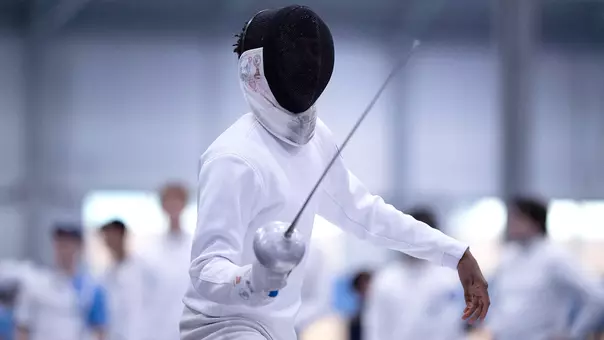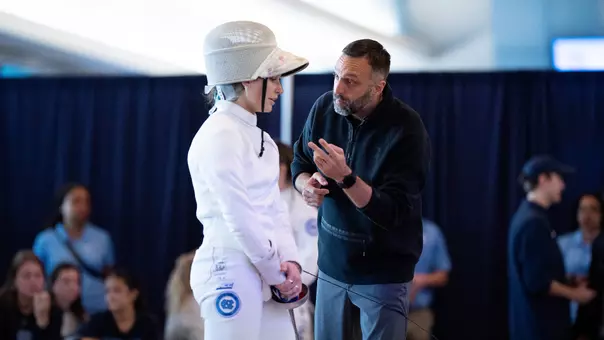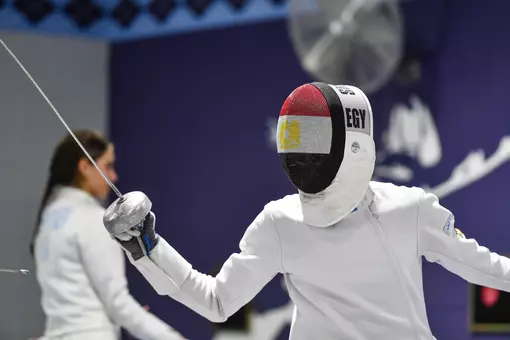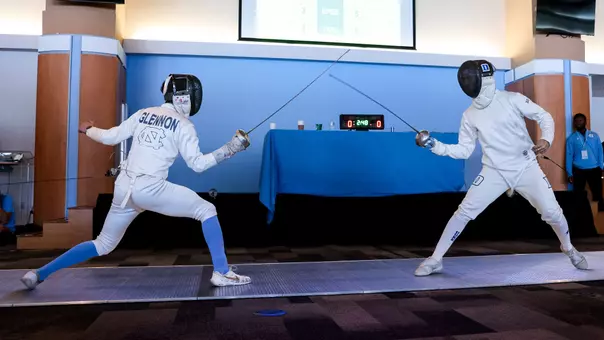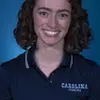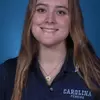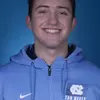University of North Carolina Athletics
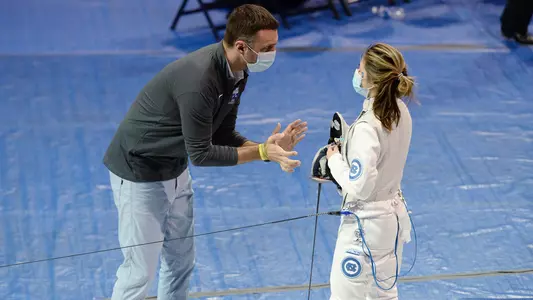
Photo by: UNC Athletic Communications
Q & A With Coach Jednak: A Look Ahead To The Spring Season
January 14, 2022 | Fencing
CHAPEL HILL - The North Carolina fencing spring season will get underway this weekend as the Tar Heels head to the Penn State Duals on Sunday, January 16th. The Penn State Duals will be the start of a fast-paced season that will see the Tar Heels compete on the strips nearly every weekend until the NCAA Championships in late March. Hopes are high surrounding the fencing program after some quality performances against top opposition during the fall season.
At the Western Invitational at the Air Force Academy in November, both the men's and women's teams finished the weekend with winning records. The men's team nearly pulled off the upset against Columbia, the 2019 national champions, falling by only three points. The Tar Heels will again match up against Columbia this weekend at Penn State.
The Tar Heels will look to continue to improve throughout the spring season, building from an impressive group of young athletes that qualified for the 2021 NCAA Championships. In total, 11 Tar Heels qualified for NCAAs, including at least one athlete from each weapon group in each gender. Carolina finished sixth in the team competition, marking one of its best performances in recent history. Nine of the eleven athletes return for the spring season. Using their talent and experience, the Tar Heels will look to qualify more athletes to compete in the 2022 NCAA Championships in South Bend, Indiana.
Leading into the NCAA Championship, the Heels will make the short trip to Duke to fight for an ACC Championship. The men's team is in search of their first ACC team championship since the tournament was brought back in 2015. The women's team will look to capture their first title since 2018. To get their hands on the ACC title, the Tar Heels will have to conquer nationally ranked programs such as Duke and 2021 national champion Notre Dame.
Coach Matt Jednak will be leading the Tar Heels in his third season as the head coach. The former assistant and student-athlete in the program will look to build off last year's success and continue to work on getting the best out of this talented group.
Q- What did you see from the team this fall season?
A- While the first few meets have no bearing on postseason selection, the competition level is still really high. We reinforce and solidify the cultural expectations of the program while still getting great reps against high-level opponents. A large portion of the fall is getting the athletes physically ready to go. The days are long, we will start the meet around eight in the morning and finish up at around six. It's a long day of competing both physically and mentally. We want to make sure we are in it and focused, even when it's towards the end of the day and fatigue starts to creep in. Another big part of the fall is to try to get the athletes a taste of why we are training so hard. We do a lot of hard conditioning in practice, exercises that are beyond strictly fencing things, but that's because we are trying to prepare them for a season that is a little bit different than they are used to coming out of high school.
Q- What does teamwork look like in fencing?
A- We talk about teamwork all the time because in order to get where you want to go you have to have a support system. You can't go out there in practice and get better by yourself. You must have a like-minded group of people who aren't in it for themselves. If the team can say "it doesn't need to be about me, it needs to be about us, it's us getting better", you are getting better, your training partner is getting better, and the team is going to get better. It's a cyclical piece where it is the sum of the parts that is greater than any one individual. We want the training room to have a lot of different styles and aesthetics, tempos, speeds, and heights, so when we are training, we are getting a replication of what we are going to see during the season. The idea of teamwork also spills over to competition. If you've sweated and bled and built trust with a person during practice, then when things are getting tough you have that person you can lean back on and ask for help. You know you can trust that person to give you honest and helpful feedback on your opponent or yourself. With that, you can grow through every bout.
Q- What are your goals for the team this spring?
A - Our goals are always the same, we want to qualify the maximum number of people we can for the NCAA Championships, which is two fencers per weapon per gender. That brings it to a maximum of 12 people that we are looking to qualify. I think for the team, we just keep on going no matter what lineup goes out there on the strip for that meet. They are going to support each other and trust that we are putting them in a place to be successful. We are going to continue to challenge them. There is no real easy part of our schedule, we have a very small turnaround between our competitions and when we must go again. The team has to be sure to stay tuned to what their body is feeling like, whether it's injury or what their mental state is, or a tactical thing. Just making sure we address those as we can keep going through each one.
Q- What is the team looking to improve on?
A- There are some technical things we are going to continue to work on as a unit, which is a big piece of it. Another thing is just continuing to believe in ourselves and the confidence that we are doing the right things in training. I'd imagine it happens in other sports as well when we get into practice, and we are training with the same people day in and day out. Sometimes, when you get into a competition, you lack the confidence to do the moves your teammates have seen you do hundreds of times, even if it's a strong thing to do. Believing in our skill sets and our strengths against an opponent who hasn't seen you as much as your teammates is a really big peace for them to continue to realize. They come in with a skill set and we hone it to make it stronger, and they can execute it against someone who they haven't fenced against every day.
Q- Who emerged as team leaders this fall?
A - Our captains do a really good job. Aubrey Molloy, Beni Rabinowitz, and Claire Harmon are our leaders by title as captains. There are also our second years, our sophomore class, that are on the team right now that were able to qualify for nationals last year who have the experience of already being there. Their attempt to replicate that is really interesting to watch. There is pressure that they put on themselves to repeat it. There is also this idea that other teams have now seen them, so they are trying to make sure that their game is evolving and changing. It's been nice to see them continue to push and grow. We've seen a lot of good results from them in the fall season. All our competitors, not just our current sophomore class, but everybody that went to NCAA's put up a very significant role as leaders this fall. We have our captains out there, but for us specifically, the leaders don't actually wear those name tags. It's the person who can see a moment where they need to call a time-out, and know that their teammates will not only take the time to listen to them but believe in the action and energy that they are there for. That's a lot of what our sports psychology is about. How do those communications skills stay alive? How do we make sure that we reach people appropriately? How do they hear it? If I say something one way and it's not received correctly, then it really didn't hit its mark. We need to make sure that we are dialoguing correctly for what the person needs to hear. If I tell you something very technical but you need to hear something more emotional then I'm not reaching you. Our leaders are constantly, at each level of class, pushing themselves to enhance that level of communication but also being supportive while we are competing.
Q- What are the big dates on the calendar this season?
A- Every meet has its nuances. The first meet we come back to will be big because it's the first meet of the spring season. From there, look to the next one in a row and really try to find out what's working. It's like you are going out to the golf course, you pick up your irons, wedges, and your woods, and you figure out what's working well that weekend. The next time you pick them up they might not be working the same. Just keeping yourself loose and keeping the expectations down. I have to adjust to make my game work and be organic with what is working and continue to push that.
At the Western Invitational at the Air Force Academy in November, both the men's and women's teams finished the weekend with winning records. The men's team nearly pulled off the upset against Columbia, the 2019 national champions, falling by only three points. The Tar Heels will again match up against Columbia this weekend at Penn State.
The Tar Heels will look to continue to improve throughout the spring season, building from an impressive group of young athletes that qualified for the 2021 NCAA Championships. In total, 11 Tar Heels qualified for NCAAs, including at least one athlete from each weapon group in each gender. Carolina finished sixth in the team competition, marking one of its best performances in recent history. Nine of the eleven athletes return for the spring season. Using their talent and experience, the Tar Heels will look to qualify more athletes to compete in the 2022 NCAA Championships in South Bend, Indiana.
Leading into the NCAA Championship, the Heels will make the short trip to Duke to fight for an ACC Championship. The men's team is in search of their first ACC team championship since the tournament was brought back in 2015. The women's team will look to capture their first title since 2018. To get their hands on the ACC title, the Tar Heels will have to conquer nationally ranked programs such as Duke and 2021 national champion Notre Dame.
Coach Matt Jednak will be leading the Tar Heels in his third season as the head coach. The former assistant and student-athlete in the program will look to build off last year's success and continue to work on getting the best out of this talented group.
Q- What did you see from the team this fall season?
A- While the first few meets have no bearing on postseason selection, the competition level is still really high. We reinforce and solidify the cultural expectations of the program while still getting great reps against high-level opponents. A large portion of the fall is getting the athletes physically ready to go. The days are long, we will start the meet around eight in the morning and finish up at around six. It's a long day of competing both physically and mentally. We want to make sure we are in it and focused, even when it's towards the end of the day and fatigue starts to creep in. Another big part of the fall is to try to get the athletes a taste of why we are training so hard. We do a lot of hard conditioning in practice, exercises that are beyond strictly fencing things, but that's because we are trying to prepare them for a season that is a little bit different than they are used to coming out of high school.
Q- What does teamwork look like in fencing?
A- We talk about teamwork all the time because in order to get where you want to go you have to have a support system. You can't go out there in practice and get better by yourself. You must have a like-minded group of people who aren't in it for themselves. If the team can say "it doesn't need to be about me, it needs to be about us, it's us getting better", you are getting better, your training partner is getting better, and the team is going to get better. It's a cyclical piece where it is the sum of the parts that is greater than any one individual. We want the training room to have a lot of different styles and aesthetics, tempos, speeds, and heights, so when we are training, we are getting a replication of what we are going to see during the season. The idea of teamwork also spills over to competition. If you've sweated and bled and built trust with a person during practice, then when things are getting tough you have that person you can lean back on and ask for help. You know you can trust that person to give you honest and helpful feedback on your opponent or yourself. With that, you can grow through every bout.
Q- What are your goals for the team this spring?
A - Our goals are always the same, we want to qualify the maximum number of people we can for the NCAA Championships, which is two fencers per weapon per gender. That brings it to a maximum of 12 people that we are looking to qualify. I think for the team, we just keep on going no matter what lineup goes out there on the strip for that meet. They are going to support each other and trust that we are putting them in a place to be successful. We are going to continue to challenge them. There is no real easy part of our schedule, we have a very small turnaround between our competitions and when we must go again. The team has to be sure to stay tuned to what their body is feeling like, whether it's injury or what their mental state is, or a tactical thing. Just making sure we address those as we can keep going through each one.
Q- What is the team looking to improve on?
A- There are some technical things we are going to continue to work on as a unit, which is a big piece of it. Another thing is just continuing to believe in ourselves and the confidence that we are doing the right things in training. I'd imagine it happens in other sports as well when we get into practice, and we are training with the same people day in and day out. Sometimes, when you get into a competition, you lack the confidence to do the moves your teammates have seen you do hundreds of times, even if it's a strong thing to do. Believing in our skill sets and our strengths against an opponent who hasn't seen you as much as your teammates is a really big peace for them to continue to realize. They come in with a skill set and we hone it to make it stronger, and they can execute it against someone who they haven't fenced against every day.
Q- Who emerged as team leaders this fall?
A - Our captains do a really good job. Aubrey Molloy, Beni Rabinowitz, and Claire Harmon are our leaders by title as captains. There are also our second years, our sophomore class, that are on the team right now that were able to qualify for nationals last year who have the experience of already being there. Their attempt to replicate that is really interesting to watch. There is pressure that they put on themselves to repeat it. There is also this idea that other teams have now seen them, so they are trying to make sure that their game is evolving and changing. It's been nice to see them continue to push and grow. We've seen a lot of good results from them in the fall season. All our competitors, not just our current sophomore class, but everybody that went to NCAA's put up a very significant role as leaders this fall. We have our captains out there, but for us specifically, the leaders don't actually wear those name tags. It's the person who can see a moment where they need to call a time-out, and know that their teammates will not only take the time to listen to them but believe in the action and energy that they are there for. That's a lot of what our sports psychology is about. How do those communications skills stay alive? How do we make sure that we reach people appropriately? How do they hear it? If I say something one way and it's not received correctly, then it really didn't hit its mark. We need to make sure that we are dialoguing correctly for what the person needs to hear. If I tell you something very technical but you need to hear something more emotional then I'm not reaching you. Our leaders are constantly, at each level of class, pushing themselves to enhance that level of communication but also being supportive while we are competing.
Q- What are the big dates on the calendar this season?
A- Every meet has its nuances. The first meet we come back to will be big because it's the first meet of the spring season. From there, look to the next one in a row and really try to find out what's working. It's like you are going out to the golf course, you pick up your irons, wedges, and your woods, and you figure out what's working well that weekend. The next time you pick them up they might not be working the same. Just keeping yourself loose and keeping the expectations down. I have to adjust to make my game work and be organic with what is working and continue to push that.
Players Mentioned
UNC Wrestling: Tar Heels Top Blue Devils, 25-13
Saturday, February 07
Rivalry Rewind pres. by Facebook - March 9, 2019
Saturday, February 07
WBB: Post-Clemson Press Conference - Feb. 5, 2026
Friday, February 06
UNC Women's Basketball: Grant, Harris Send Tar Heels Over Clemson, 53-44
Friday, February 06










